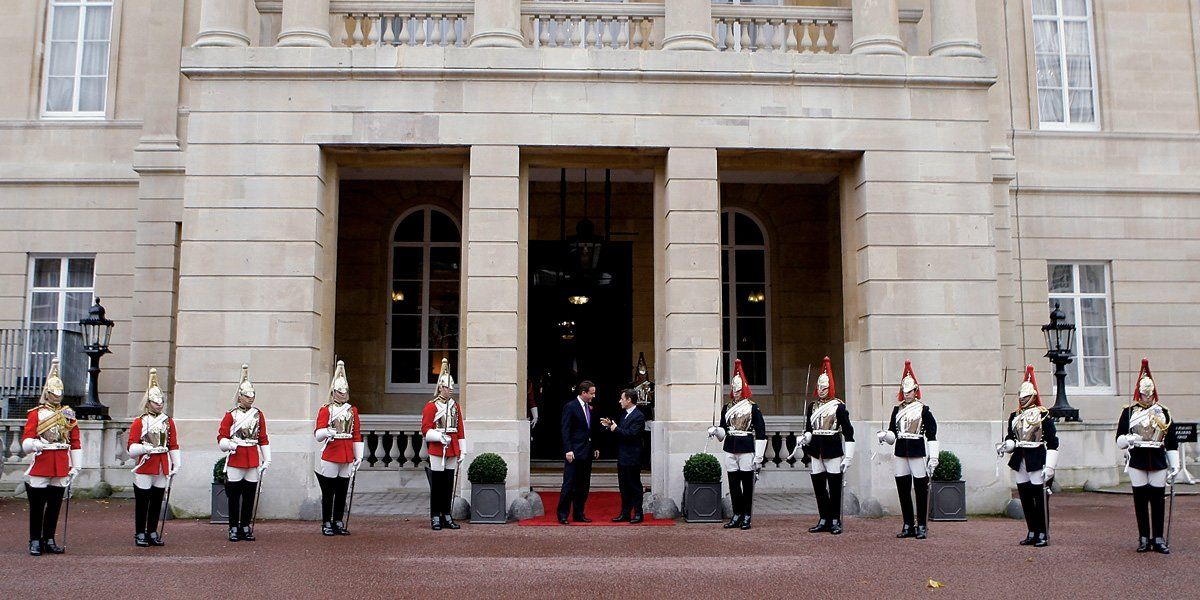
At the 2004 banquet to mark the centenary of the Entente Cordiale, the grand Anglo-French friendship pact, Queen Elizabeth allowed herself a small example of British understatement. She told her French hosts, "Our historical relationship has not always been smooth." In plainer speech, that means a few hundred years of mutual suspicion punctuated by open warfare. And though the shooting has stopped, the wariness remains. Britain mistrusts French ambitions in Europe; France mistrusts Britain's ties with America. By and large, the cordiality has been kept for state occasions.
Small wonder then that the latest pact excited the skeptics. Last week Prime Minister David Cameron and President Nicolas Sarkozy signed treaties on military collaboration covering a slew of areas from the joint development of new nuclear weaponry to the sharing of two aircraft carriers and the creation of a 5,000-strong Anglo-French expeditionary force. British tabloids reacted with predictable expressions of prejudice; it's the British who cling closest to the old hostility. Conservative M.P. Bernard Jenkin rejected "a strategic fusion" with a nation that has "diametrically different strategic objectives" and a "long track record of duplicity."
The two leaders feel otherwise. Clearly, nuclear weapons and aircraft carriers are standard symbols of national virility, but this is an agreement between cash-strapped nations dictated by modern circumstances. Cameron called it an accord between "natural partners" grounded in "pragmatism not sentiment." Unlike their fellow Europeans, the French and British still want the global clout that goes with the ability to deploy force overseas. Together their military budgets account for almost half of the EU's total. But in the days of ever-smarter weaponry that's an expensive goal, and debt-laden nations can't hope to meet the bills alone. The British last month announced an 8 percent cut in defense spending. When a single aircraft carrier costs $3 billion, collaboration is sensible.
It's also good business. Britain and France are home to some of Europe's biggest defense companies. Britain's defense industry generates annual revenues of roughly $57 billion and employs 300,000; its $21 billion French counterpart employs 165,000. And the big national concerns such as BAE and Dassault need the economies of scale and the flow of mega-contracts that international cooperation should help to ensure. As the two leaders were signing their pact, BAE announced talks with Dassault on joint development of a new generation of pilotless drones.
The deal recognizes that modern wars rarely pit a single nation against another. As Cameron observed, in the last 30 years Britain has only twice taken independent military action, in the Falklands campaign of 1982 and in Sierra Leone in 2000. British troops have served happily under a French general in Bosnia, as part of a U.N. force. For his part, Sarkozy said he struggled to imagine a crisis involving Britain where the French too might not want to commit an aircraft carrier. Remember too that much of a navy's work these days is providing security against piracy or helping to deliver humanitarian aid.
To some, the new pact may look like a step toward some form of European army, a pet project of previous French governments always viewed with deep suspicion in Washington, as a possible rival for NATO. Not so, say the experts. More likely, the arrangement draws France—newly readmitted to NATO's central military command structure after a 43-year absence—closer to the U.S. through the tie-up with America's faithful British allies. "It is dragging in the French more and more," says Stephen Flanagan, of the Center for Strategic and International Studies in Washington. France's linkup with Britain tacitly acknowledges that its bolder ideas for a common EU defense force have foundered. The multinational Eurocorps, founded in 1992, has never grown beyond token brigade strength.
In fact, this is the kind of burden sharing that America, eager to see its European allies invest more in defense, should applaud. Since last year 10 NATO countries, as well as Finland and Sweden, have joint access to a small fleet of outsize heavy airlift planes based in Hungary, and the possibility of more such deals will be on the agenda when NATO's leaders meet in Lisbon next week. France and Britain could be the pioneers of still more cordial agreements. Now that would be smooth.
With Tracy McNicoll
Uncommon Knowledge
Newsweek is committed to challenging conventional wisdom and finding connections in the search for common ground.
Newsweek is committed to challenging conventional wisdom and finding connections in the search for common ground.





